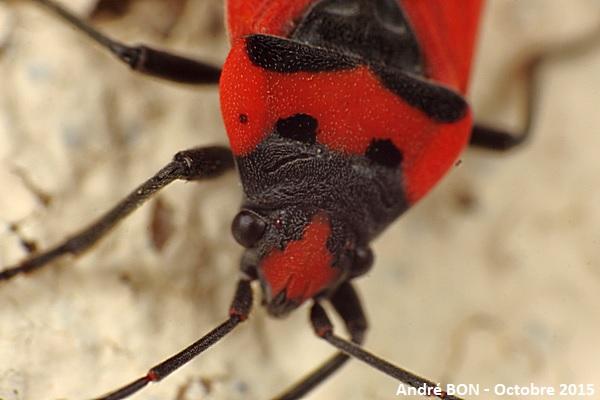

| Black-and-Red-bug (Lygaeus equestris (Linnaeus, 1758)) |


|
|
Scientific name: Lygaeus equestris (Linnaeus, 1758) Common name: Black-and-Red-bug French name: Punaise écuyère Order: Heteroptera Family: Lygaeidae Wingspan : 10 à 12 mm. Biotope: Sunny meadows and woodland edges, often on trunks or walls exposed to sunshine. Geographic area: Europe, Asia (missing in China), Africa. Observation period : August to June of the next year. |
The Black-and-Red-bug shows a lengthy body. There is a round white spot on the membrane of the hemelytra. The head id red in the centre and black on the edges. The pronotum is red with two black spot near the head an a thin black margin on the back side. The scutellum is black and its back tip is between two black spots. The coria is red and crossed by a black transversal stripe. There is a possible confusion with Lygaeus simulans which was distinguished only very recently as a new species from the Black-and-Red-bug (Lygaeus equestris). The main criteria which enable to tell Lygaeus simulans and Lygaeus equestris apart are the antennae which bear angulous tubercles on Lygaeus simulans. The antennae are more threadlike on Lygaeus equestris. The scutellum shows a small pubescence on Lygaeus simulans which does not exist on Lygaeus equestris. The red area on the head is larger on Lygaeus simulans and the lateral black edges are thinner. Black-and-Red-bugs over winter at the adult state. |
| [To know more about the Black-and-Red-bug] [Next picture] [Top] |

|
I have not noticed any pubescence on the scutellum even by strongly zooming on the non reduced picture. |
| [To know more about the Black-and-Red-bug] [Previous picture] [Top] |

|
The black area is rather large on the head, close to the eyes. This rather confirms Lygaeus equestris. |